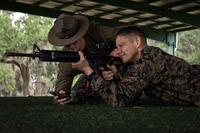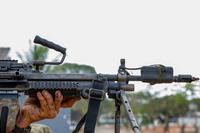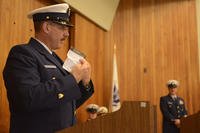The military team tracking anti-war protesters is now digging through bank records, too. "The Pentagon has been using a little-known power to obtain banking and credit records of hundreds of Americans and others suspected of terrorism or espionage inside the United States," the Times reports. It's "part of an aggressive expansion by the military into domestic intelligence gathering. And the CIA is joining in, also "issuing what are known as national security letters to gain access to financial records from American companies."
"The Pentagon has been using a little-known power to obtain banking and credit records of hundreds of Americans and others suspected of terrorism or espionage inside the United States," the Times reports. It's "part of an aggressive expansion by the military into domestic intelligence gathering. And the CIA is joining in, also "issuing what are known as national security letters to gain access to financial records from American companies."
The letters provide tremendous leads to follow and often with which to corroborate other evidence in the context of counterespionage and counterterrorism, said Maj. Patrick Ryder, a Pentagon spokesman...
But even when the initial suspicions are unproven, the documents have intelligence value, military officials say. In the next year, they plan to incorporate the records into a database at the Counterintelligence Field Activity office at the Pentagon to track possible threats against the military, Pentagon officials said...
Some national security experts and civil liberties advocates are troubled by the C.I.A. and military taking on domestic intelligence activities, particularly in light of recent disclosures that the Counterintelligence Field Activity office had maintained files on Iraq war protesters in the United States in violation of the militarys own guidelines. Some experts say the Pentagon has adopted an overly expansive view of its domestic role under the guise of force protection, or efforts to guard military installations...
One prominent case in which letters were used to obtain financial records, according to two military officials, was that of a Muslim chaplain at Guantnamo Bay, Cuba, who was suspected in 2003 of aiding terror suspects imprisoned at the facility. The espionage case against the chaplain, James J. Yee, soon collapsed, and he was eventually convicted on lesser charges of adultery and downloading pornography.
Eugene Fidell, a defense lawyer for the former chaplain and a military law expert, said he was unaware that military investigators may have used national security letters to obtain financial information about Mr. Yee, nor was he aware that the military had ever claimed the authority to issue the letters.
Mr. Fidell said he found the practice disturbing,? in part because the military does not have the same checks and balances when it comes to Americans civil rights as does the F.B.I. Where is the accountability? he asked. Thats the evil of it it doesnt leave fingerprints.
(Big ups: DK)







